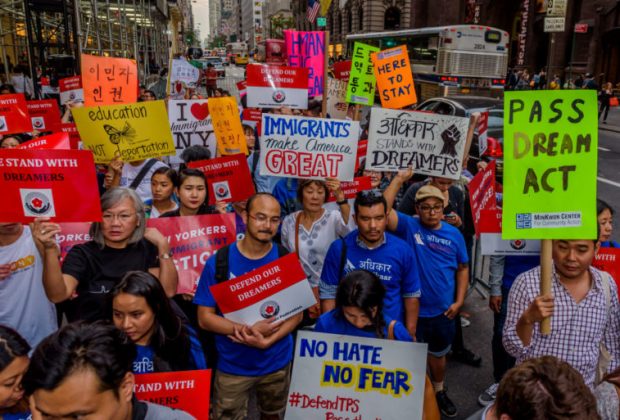By Wendy Thurm ~50 States of Blue ~ December 20, 2017
SAN FRANCISCO, CALIF. — A federal district judge heard nearly four hours of legal argument on Wednesday morning in five consolidated lawsuits challenging the Trump Administration's rescission of the Deferred Action for Childhood Arrivals (DACA) program. U.S. District Judge William H. Alsup peppered attorneys for the Regents of the University of California (one of the plaintiffs) and the U.S. Department of Justice with questions about whether the Department of Homeland Security's decision to rescind the Obama-era program was reviewable by the court, and if so, whether DHS acted arbitrarily and capriciously.
The attorneys and Judge Alsup parried legal cases and arguments before a courtroom packed with lawyers, reporters, and DACA recipients. And while the discussion occasionally bordered on esoteric legal questions, Judge Alsup returned again and again to two competing points: that elections have consequences; but that those individuals who applied for and received protection under DACA have worked, paid taxes, taken out loans, gone to school, gotten married, and had children with the reasonable expectation that they’d be able to stay in the U.S.
DACA dates to a June 15, 2012 memorandum by then Secretary of Homeland Security Janet Napolitano (who is now, coincidentally, the President of the Board of Regents of the University of California). In that memo, DHS announced a policy of deferred deportation action against undocumented immigrants who had been brought to the U.S. as children under the age of 15, and who had not yet turned 31. Under the policy, an application process was established. If an application was approved, it resulted in two years of DACA protection and work authorization documents.
At issue in today’s hearing is Acting DHS Secretary Elaine Duke’s September 5, 2017 Rescission Memorandum, which ordered a wind down of the DACA program: no new applications for DACA protection could be filed after September 5 and renewal applications for those whose DACA protections were to expire before March 5, 2018, had to be filed no later than October 5, 2017. The Acting Secretary provided two reasons for her decision: litigation risk and a letter from Attorney General Jefferson Sessions that the DACA program was an unlawful action by President Obama.
As to litigation risk, Acting Secretary Duke pointed to the fact that a federal district judge in Texas had issued a nationwide preliminary injunction to halt enforcement of two programs related to DACA; namely the Deferred Action for Parents of Americans and Lawful Permanent Residents (“DAPA”) program, and an expansion of DACA program that extended the protection from two years to three years, and created eligibility for undocumented immigrants who fell outside the original DACA terms. The U.S. Court of Appeals for the Fifth Circuit affirmed that decision and the U.S. Supreme Court split 4-4, which had the effect of leaving the Fifth Circuit decision in place. The State of Texas, a plaintiff in DAPA case, threatened additional litigation over the original DACA program if DHS didn’t announce a wind down of the program by September 5, 2017.
The Department of Justice, represented by attorneys Brett Schumate and Brad Rosenberg, pressed Judge Alsup to dismiss the consolidated cases. They argued that the Rescission Memorandum reflected only DHS’s decision about how to exercise its deportation discretion, and that such decisions are not reviewable by a court. Jeffrey Davidson, representing the UC Regents, replied that the Memorandum reflected a programmatic decision to not exercise discretion at all after March 5, 2018, giving the court a basis for review. Judge Alsup appeared to be struggling with how to resolve this issue.
The court then turned to the Regents’ request for a preliminary injunction, to halt the effect of the Rescission Memorandum and return the parties to the DACA status quo pending a full trial on the merits. Over and over, Mr. Davidson pointed to the lack of any evidence that DHS had considered any information in terminating the DACA program other than litigation risk, which, he argued, is not a sufficient basis for eliminating an entire government program. He also pointed to comments made by Attorney General Sessions at the announcement of the new policy that focused on crime, border security and loss of job opportunities for U.S. citizens — factors that were nowhere to be found in DHS’s Memorandum — suggesting that the litigation risk rationale was pretextual, and thus invalid.
In defending the rescission decision, Mr. Rosenberg noted that the Justice Department makes decisions every day about how to manage all of the litigation involving the U.S. government. Each one of those decisions reflects DOJ’s exercise of judgment and discretion, which are unreviewable by courts. At one point, Mr. Rosenberg wondered how the Attorney General would defend the DACA program in court if he believed it to be unlawful. All I could think about was Sally Yates, who was the Acting Attorney General at the time President Trump imposed his first travel ban, and who refused to defend it in court because she believed it unconstitutional. For that, she was fired.
Throughout the hearing, Judge Alsup seemed to be searching for Supreme Court or Ninth Circuit caselaw that would tell him how to rule. But as with many things related to the Trump Administration, when government power is exercised in a certain way for the first time, there isn’t often a clear roadmap for how to evaluate it.
This afternoon, the Supreme Court did issue a ruling on a discovery dispute in the case. Judge Alsup had ordered DHS to produce materials beyond the administrative record it said the Acting Secretary relied on in making her decision to rescind DACA. The Justice Department appealed that ruling all the way to the Supreme Court and today the Court said the federal government need not make those disclosures at this stage of the case. The Court held that the district should first resolve DHS’s motion to dismiss the case and the UC Regents’ motion for preliminary injunction before considering whether the administrative record must be supplemented. The Court made clear that its ruling “does not suggest any view on the merits” of the legal dispute.
With such legal uncertainty, efforts are underway in Congress enact legislation to provide permanent protection for so-called DREAMers. Whether and when that will come together under Republican rule is anyone’s guess.
Source: 50 States of Blue







